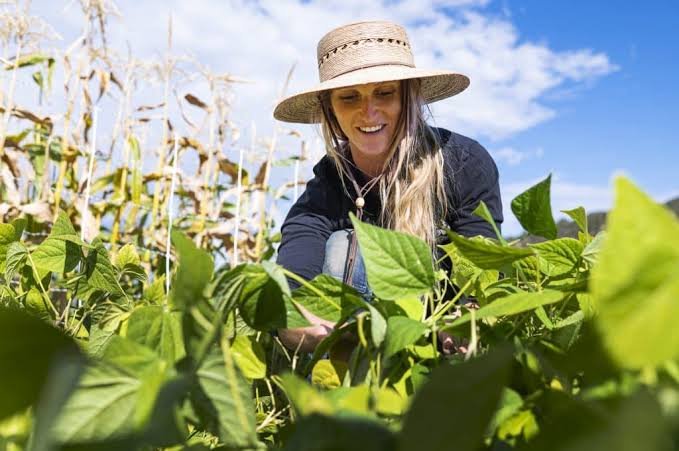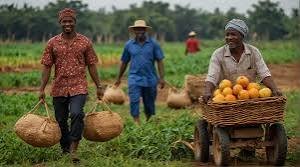Agriculture Definition: Understanding the Backbone of Human Civilization
Agriculture is the foundation of human civilization, providing food, raw materials, and employment for billions of people. This blog explores the definition of agriculture, its types, importance, challenges, and future innovations. Learn how modern technology is transforming farming and how sustainable practices can ensure food security for future generations.

What is Agriculture?
Agriculture is the science and practice of growing crops and raising animals for food, fiber, medicine, and other products. It has been the foundation of human survival and economic growth for thousands of years. Without agriculture, people would have to depend on hunting and gathering, which cannot sustain large populations. The word "agriculture" comes from the Latin words ager (field) and cultura (cultivation). This means agriculture is all about cultivating land to produce useful plants and animals. Today, agriculture is more advanced due to modern technology, making food production more efficient and profitable. Farmers now use machines, improved seeds, irrigation, and fertilizers to increase productivity. Agriculture also supports industries such as food processing, textiles, and biofuel production. Because of its importance, agriculture remains one of the largest industries in the world.
Types of Agriculture
There are different types of agriculture, each serving specific purposes based on location, climate, and resources. One major type is subsistence farming, where farmers grow food mainly for their families, using simple tools and traditional methods. In contrast, commercial farming focuses on producing large quantities of crops and livestock for sale in markets. Another important type is organic farming, which avoids synthetic chemicals and uses natural methods to grow crops and raise animals. Agroforestry combines agriculture with tree planting to improve soil health and biodiversity. Aquaculture, or fish farming, is also a growing part of agriculture, providing a steady supply of fish and seafood. Livestock farming involves raising animals like cows, goats, sheep, and poultry for meat, milk, and eggs. Each type of agriculture plays a crucial role in feeding the world and ensuring economic stability.

Importance of Agriculture
Agriculture is essential because it provides food, raw materials, and jobs for millions of people. Without agriculture, there would not be enough food to feed the growing population. Crops like rice, maize, wheat, and cassava are staple foods in many countries, feeding billions of people every day. Agriculture also supplies raw materials for industries such as textile, pharmaceutical, and biofuel production. Cotton, for example, is used in clothing, while medicinal plants are used in making drugs. Agriculture is a major source of income for many countries, especially those that export crops like cocoa, coffee, palm oil, and rubber. It also plays a key role in rural development by creating employment opportunities and improving infrastructure. The future of agriculture depends on sustainable practices that protect the environment while ensuring food security.
Challenges in Agriculture
Despite its importance, agriculture faces several challenges that affect productivity and profitability. One major issue is climate change, which leads to unpredictable weather, droughts, floods, and reduced crop yields. Soil degradation is another problem caused by over-farming, deforestation, and excessive use of chemicals. Pests and diseases also destroy crops and livestock, leading to food shortages and financial losses. Farmers often struggle with high production costs, such as the price of seeds, fertilizers, and farm equipment. Market instability is another challenge, as crop prices can fluctuate, making it hard for farmers to earn stable incomes. Additionally, lack of access to modern farming techniques and credit facilities prevents small-scale farmers from expanding their businesses. Governments and organizations must support farmers by providing funding, research, and technology to overcome these challenges.
Future of Agriculture
The future of agriculture depends on innovation, technology, and sustainable practices. One promising solution is precision farming, which uses drones, sensors, and data analysis to improve crop yields and reduce waste. Hydroponics and vertical farming allow food to be grown in urban areas using less land and water. Genetically modified crops (GMOs) help increase resistance to pests and diseases, ensuring higher production. Sustainable practices such as crop rotation, organic farming, and agroforestry help maintain soil fertility and reduce environmental damage. Governments and organizations are also investing in agriculture education and research to train farmers on modern techniques. As the global population continues to grow, agriculture must adapt to meet the increasing demand for food while protecting natural resources.

Conclusion
Agriculture is the foundation of civilization, providing food, raw materials, and employment for billions of people. It has evolved from traditional farming to modern, technology-driven practices that increase efficiency and sustainability. However, challenges such as climate change, pests, and market instability must be addressed to ensure food security. The future of agriculture lies in innovation, research, and eco-friendly farming methods. By supporting agriculture, we ensure a better future for farmers, consumers, and the global economy.
What's Your Reaction?





















